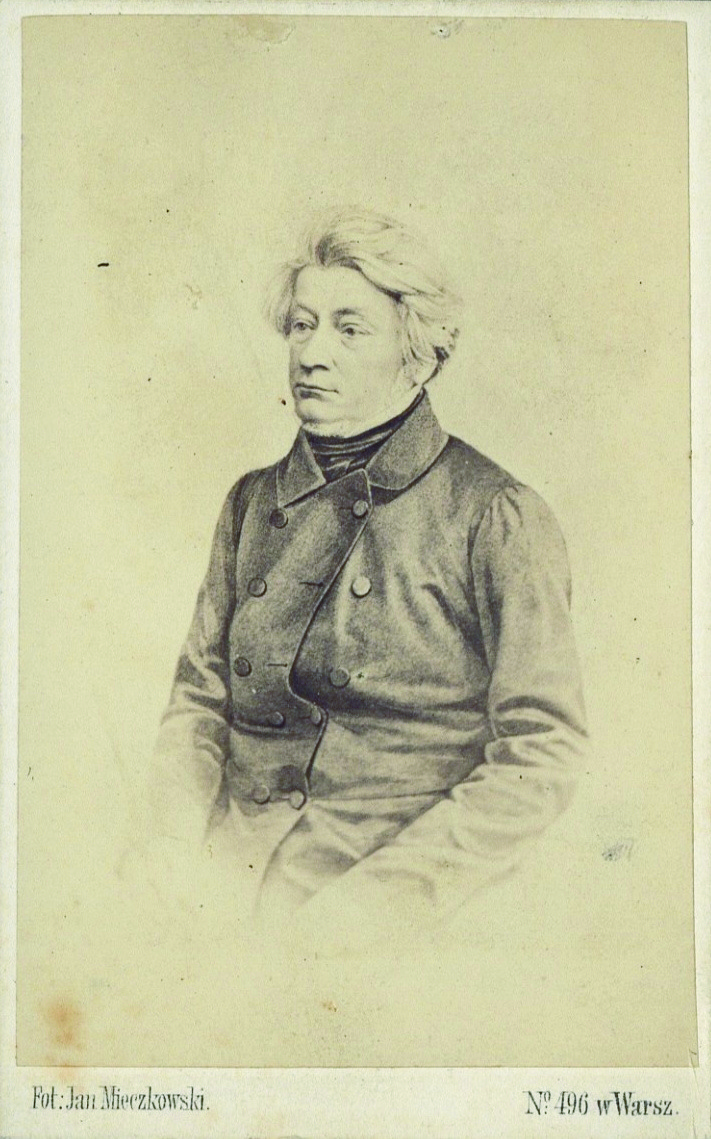Adam Mickiewicz
, 1798 - 1855
A Polish national poet, political writer, dramatist, essayist, and translator; one of the most prominent authors of the Polish Romantic period, the eldest of the “Three National Bards,” next to Juliusz Słowacki (1809–1849) and Zygmunt Krasiński (1812–1859).
Born December 24, 1798 in Zaosie or Nowogródek in the former Polish-Lithuanian Commonwealth at that time under Russian control (now in Belarus). Educated at a Dominican school in Nowogródek, later – in 1815 – attended the Imperial University of Wilno (Vilnius). Founded a secret Philomath Society in 1817 (with another poet and activist Tomasz Zan); its purpose was self-education, scientific research work, educative and political activity within the academic environment. While the organization focused on the development of the individual, it was connected to a more politically oriented student group, Philareth Association. Arrested in 1823 or 1824, Mickiewicz was exiled to Russia, where he was able to travel and stay in Saint Petersburg, Moscow and Crimea; he also made quite a few eminent friends, including the famous Russian poet, Alexander Pushkin. After five years of exile, the poet travelled abroad, to Weimar, Berlin, Prague, Rome, Dresden, Leipzig, and Paris. His visit to France was related to several very important events: the outbreak of the November Uprising (1830–1831); marriage to Celina Szymanowska (1834); meeting with the philosopher Andrzej Towiański (1835) and the subsequent adoption of Towiański’s ideas of Polish Messianism and religious mysticism; taking the position of lecturer at the Collège de France, Chair of Slavic Languages. In 1849 Mickiewicz founded a French newspaper La Tribune des Peuples. He died November 26, 1855 having contracted cholera in Constantinople where he went to organize Polish military forces in relation to the outbreak of the Crimean War.
Mickiewicz made his debut with the poem Zima miejska [City Winter], 1818, published in Tygodnik Wileński [Vilnius Weekly]. His numerous poems include: Oda do młodości [Ode to Youth], 1820; a collection of poems Ballady i romanse [Ballads and Romances], 1822; Grażyna, 1823; Sonety krymskie [Crimean Sonnets], 1826; Konrad Wallenrod, 1828; Księgi narodu polskiego i pielgrzymstwa polskiego [Books of the Polish Nation and Polish Pilgrimage], 1832; the national epic poem Pan Tadeusz, czyli ostatni zajazd na Litwie. Historia szlachecka z roku 1811 i 1812 we dwunastu księgach wierszem [Sir Thaddeus, or the Last Lithuanian Foray. A Nobleman’s Tale from the Years 1811 and 1812 in Twelve Books of Verse], 1834, and a drama in verse Dziady [Forefathers’ Eve], in four parts, 1822–1860.
Sources:
Dernałowicz, Maria, Adam Mickiewicz, Warszawa: Wiedza Powszechna, 1985.
Makowski, Stanisław and Eligiusz Szymanis, Adam Mickiewicz, Warszawa: Wydawnictwa Szkolne i Pedagogiczne, 1992.
Bio prepared by Małgorzata Glinicka, University of Warsaw, muktaa.phala@gmail.com
Records in database:



